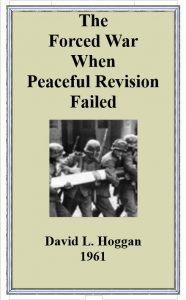SHORTLY AFTER MIDNIGHT on July 4, 1984, the headquarters of the Institute for Historical Review was attacked by terrorists. They did their job almost to perfection: IHR’s office were destroyed, and ninety per cent of its inventory of books and tapes wiped out. To this day the attackers have not been apprehended, and the authorities — local, state, and federal — have supplied little indication that they ever will be.
The destruction of IHR’s offices and stocks meant a crippling blow for Historical Revisionism, the world-wide movement to bring history into accord with the facts in precisely those areas in which it has been distorted to serve the interests of a powerful international Establishment, an Establishment all the more insidious for its pious espousal of freedom of the press. That one of the few independent voices for truth in history on the planet was silenced by flames on America’s Independence Day in the year made infamous by George Orwell must have brought a cynical smile to the face of more than one enemy of historical truth: the terrorists, whose national loyalties certainly lie elsewhere than in America, chose the date well. Had IHR succumbed to the arsonists, what a superb validation of the Orwellian dictum: “Who controls the past controls the future. Who controls the present controls the past.”!
One of the chief casualties of the fire was the text of the book you now hold in your hands. Too badly charred to be reproduced for printing plates, over six hundred pages of The Forced War had to be laboriously reset, reproofed, and re-corrected. That this has now been achieved, despite the enormous losses and extra costs imposed by the arson, despite the Institute’s dislocation and its continued harassment, legal and otherwise, by the foes of historical truth, represents a great triumph for honest historiography, for The Forced War, more than a quarter century after it was written, remains the classic refutation of the thesis of Germany’s “sole guilt” in the origins and outbreak of the Second World War.
By attacking one of the chief taboos of our supposedly irreverent and enlightened century, David Hoggan, the author of The Forced War, unquestionably damaged his prospects as a professional academic. Trained as a diplomatic historian at Harvard under William Langer and Michael Karpovich, with rare linguistic qualifications, Hoggan never obtained tenure. Such are the rewards for independent thought, backed by thorough research, in the “land of the free.”
The Forced War was published in West Germany in 1961 as Der erzwungene Krieg by the Verlag der Deutschen Hochschullehrer-Zeitung (now Grabert Verlag) in Tübingen. There it found an enthusiastic reception among Germans, academics and laymen, who had been oppressed by years of postwar propaganda, imposed by the victor nations and cultivated by the West German government, to the effect that the German leadership had criminally provoked an “aggressive” war in 1939. Der erzwungene Krieg has since gone through thirteen printings and sold over fifty thousand copies. The famous German writer and historian Armin Mohler declared that Hoggan had brought World War II Revisionism out of the ghetto” in Germany.
